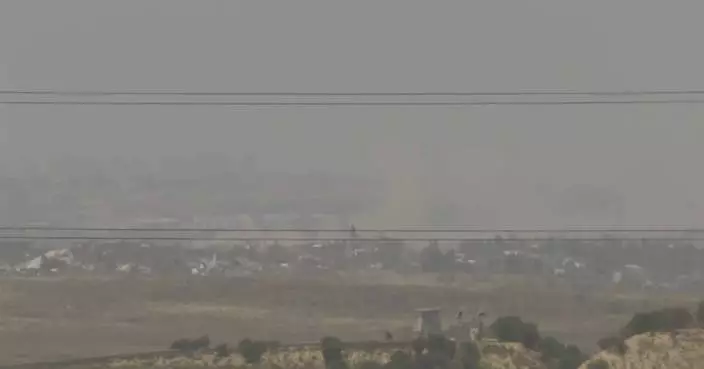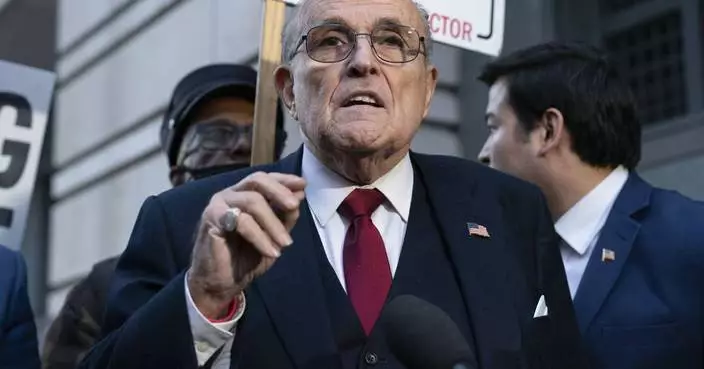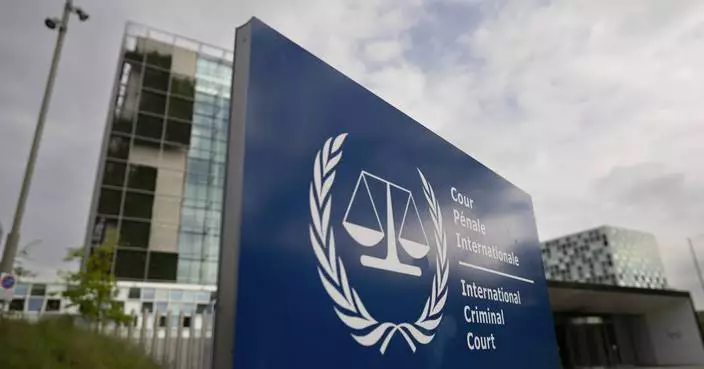WASHINGTON (AP) — The U.S. Drug Enforcement Administration will move to reclassify marijuana as a less dangerous drug, The Associated Press has learned, a historic shift to generations of American drug policy that could have wide ripple effects across the country.
The proposal, which still must be reviewed by the White House Office of Management and Budget, would recognize the medical uses of cannabis and acknowledge it has less potential for abuse than some of the nation’s most dangerous drugs. However, it would not legalize marijuana outright for recreational use.
The agency's move, confirmed to the AP on Tuesday by five people familiar with the matter who spoke on the condition of anonymity to discuss the sensitive regulatory review, clears the last significant regulatory hurdle before the agency’s biggest policy change in more than 50 years can take effect.
Once OMB signs off, the DEA will take public comment on the plan to move marijuana from its current classification as a Schedule I drug, alongside heroin and LSD. It moves pot to Schedule III, alongside ketamine and some anabolic steroids, following a recommendation from the federal Health and Human Services Department. After the public comment period and a review by an administrative judge, the agency would eventually publish the final rule.
“Today, the Attorney General circulated a proposal to reclassify marijuana from Schedule I to Schedule III," Justice Department director of public affairs Xochitl Hinojosa said in a statement. The DEA is a component of the Department of Justice. "Once published by the Federal Register, it will initiate a formal rulemaking process as prescribed by Congress in the Controlled Substances Act.”
Attorney General Merrick Garland's signature throws the full weight of the Justice Department behind the move and appears to signal its importance to the Biden administration.
It comes after President Joe Biden called for a review of federal marijuana law in October 2022 and moved to pardon thousands of Americans convicted federally of simple possession of the drug. He has also called on governors and local leaders to take similar steps to erase marijuana convictions.
“Criminal records for marijuana use and possession have imposed needless barriers to employment, housing, and educational opportunities,” Biden said in December. “Too many lives have been upended because of our failed approach to marijuana. It’s time that we right these wrongs.”
The election year announcement could help Biden, a Democrat, boost flagging support, particularly among younger voters.
Biden and a growing number of lawmakers from both major political parties have been pushing for the DEA decision as marijuana has become increasingly decriminalized and accepted, particularly by younger people. A Gallup poll last fall found 70% of adults support legalization, the highest level yet recorded by the polling firm and more than double the roughly 30% who backed it in 2000.
The DEA didn’t respond to repeated requests for comment.
Schedule III drugs are still controlled substances and subject to rules and regulations, and people who traffic in them without permission could still face federal criminal prosecution.
Some critics argue the DEA shouldn’t change course on marijuana, saying rescheduling isn’t necessary and could lead to harmful side effects.
Jack Riley, a former deputy administrator of the DEA, said he had concerns about the proposed change because he thinks marijuana remains a possible “gateway drug," one that may lead to the use of other drugs.
“But in terms of us getting clear to use our resources to combat other major drugs, that’s a positive,” Riley said, noting that fentanyl alone accounts for more than 100,000 deaths in the U.S. a year.
On the other end of the spectrum, others argue marijuana should be treated the way alcohol is.
“While this rescheduling announcement is a historic step forward, I remain strongly committed to continuing to work on legislation like the SAFER Banking Act as well as the Cannabis Administration and Opportunity Act, which federally deschedules cannabis by removing it from the Controlled Substances Act," Senate Majority Leader Sen. Chuck Schumer of New York said in a statement. “Congress must do everything we can to end the federal prohibition on cannabis and address longstanding harms caused by the War on Drugs.”
Federal drug policy has lagged behind many states in recent years, with 38 having already legalized medical marijuana and 24 legalizing its recreational use.
That’s helped fuel fast growth in the marijuana industry, with an estimated worth of nearly $30 billion. Easing federal regulations could reduce the tax burden that can be 70% or more for businesses, according to industry groups. It could also make it easier to research marijuana, since it’s very difficult to conduct authorized clinical studies on Schedule I substances.
The immediate effect of rescheduling on the nation’s criminal justice system would likely be more muted, since federal prosecutions for simple possession have been fairly rare in recent years.
But loosening restrictions could carry a host of unintended consequences in the drug war and beyond.
Critics point out that as a Schedule III drug, marijuana would remain regulated by the DEA. That means the roughly 15,000 cannabis dispensaries in the U.S. would have to register with the DEA like regular pharmacies and fulfill strict reporting requirements, something that they are loath to do and that the DEA is ill equipped to handle.
Then there’s the United States' international treaty obligations, chief among them the 1961 Single Convention on Narcotic Drugs, which requires the criminalization of cannabis. In 2016, during the Obama administration, the DEA cited the U.S.’ international obligations and the findings of a federal court of appeals in Washington in denying a similar request to reschedule marijuana.
Goodman reported from Miami, Mustian from New Orleans. AP writer Colleen Long contributed.

FILE - In this Friday, March 22, 2019, file photo, a marijuana plant is visible at Compassionate Care Foundation's medical marijuana dispensary in Egg Harbor Township, N.J. The U.S. Drug Enforcement Administration will move to reclassify marijuana as a less dangerous drug, a historic shift to generations of American drug policy that could have wide ripple-effects across the country. The DEA’s proposal still must be reviewed by the White House Office of Management and Budget. (AP Photo/Julio Cortez, File)
PARIS (AP) — The landmark trial of three former Syrian intelligence officials began Tuesday at a Paris court for the alleged torture and killing of a French-Syrian father and son who were arrested over a decade ago, during the height of Arab Spring-inspired anti-government protests.
International warrants have been issued for the defendants, being tried in absentia.
The father Mazen Dabbagh and his son, Patrick, were arrested in the Syrian capital, Damascus, in 2013, following a crackdown on demonstrations that later turned into a brutal civil war, now in its 14th year. The probe into their disappearance started in 2015 when Obeida Dabbagh, Mazen’s brother, testified to investigators already examining war crimes in Syria.
The four-day hearings come as Syria's President Bashar Assad has started to shed his longtime status as a pariah that stemmed from the violence unleashed on his opponents. Human rights groups involved in the case hope it will refocus attention on alleged atrocities.
About 50 activists gathered near the Paris Criminal Court, chanting for “freedom” and in support of the disappeared and the dead.
Arwad, a young Syrian girl who has lived in France since 2018, was not at the hearing but joined the rally. “We are refugees, we support freedom,” she said.
If the three — Ali Mamlouk, former head of the National Security Bureau, Jamil Hassan, former Air Force intelligence director, and Abdel Salam Mahmoud, former head of investigations for the service in Damascus — are convicted, they could be sentenced to life in prison in France.
The first hearing on Tuesday invited several, including Ziad Majed, a Franco-Lebanese academic specializing in Syria, for “context testimonies" in front of three judges.
Majed shed light on the history of the Assad family’s rule since the early 1970s. "The three defendants are part of the Al-Assad system. I know their names; they are also famous in Lebanon,” he said, meaning they are well-known for being part of the Assad government.
After his two-hour testimony, Majed joined the demonstrators, calling for justice for the disappeared.
Garance Le Caisne, author and writer, and François Burgat, a scholar of Islam, also testified on Tuesday. Both are experts on Syrian matters.
Le Caisne said: “Torture is not to make people talk but to silence them. The regime is very structured. Arrests are arbitrary. You disappear. You can go buy bread or meat and not return home." He added that Assad in 2011 “thought he was losing power and repressed the protesters unimaginably” and that now his government had ”complete control over the population."
Meanwhile, François Burgat said that “torture in Syria existed well before the Syrian Spring” and that “political violence” has always existed in the Middle Eastern country.
"The Assad regime wants to lead a Shiite population. They do not want the predominantly Sunni refugees to return,” she said.
The Dabbagh family lawyer, Clemence Bectarte, from the International Federation for Human Rights, told The Associated Press she had high hopes for the trial.
“This trial represents immense hope for all Syrian victims who cannot attain justice. Impunity continues to reign in Syria, so this trial aims to bring justice to the family and echo the stories of hundreds of thousands of Syrian victims,” Bectarte said.
The brother, Obeida, and his wife, Hanane, are set to testify on Thursday, the third day of the trial. “I hope the responsible parties will be condemned. This could set a precedent for holding Assad accountable,” he told the AP. “Hundreds of thousands of Syrians have died. Even today, some live in fear and terror.”
Obeida and Hanane, as well as non-governmental organizations, are parties to the trial.
“We are always afraid,” he said. “Since I started talking about this case, as soon as my brother and nephew disappeared, the motivation to see a trial took over. The fear disappeared. I am now relieved that this pain and suffering are leading to something.”
Brigitte Herremans, a senior researcher at the Human Rights Centre of Ghent University, emphasized the trial’s significance despite the defendants' absence. “It’s very important that perpetrators from the regime side are held accountable, even if it’s mainly symbolic. It means a lot for the fight against impunity,” Herremans said.
The verdict is expected on Friday.
__
Oleg Cetinic in Paris contributed to this report.

Activists hold Syrian flags next to portraits of alleged victims of the Syrian regime, during a demonstration Tuesday, May 21, 2024 at a courtroom in Paris. A Paris court will this week seek to determine whether Syrian intelligence officials — the most senior to go on trial in a European court over crimes allegedly committed during the country's civil war — were responsible for the 2013 disappearance and deaths of Patrick and Mazen Dabbagh. The four-day hearings, starting Tuesday, are expected to air chilling allegations that President Bashar Assad's government has widely used torture and arbitrary detentions to hold on to power during the conflict, now in its 14th year. (AP Photo/Michel Euler)

Portraits of Patrick Dabbagh, bottom right, and his father Mazen Dabbagh, top left, are seen during a demonstration Tuesday, May 21, 2024 at a courtroom in Paris. A Paris court will this week seek to determine whether Syrian intelligence officials — the most senior to go on trial in a European court over crimes allegedly committed during the country's civil war — were responsible for the 2013 disappearance and deaths of Patrick and Mazen Dabbagh. The four-day hearings, starting Tuesday, are expected to air chilling allegations that President Bashar Assad's government has widely used torture and arbitrary detentions to hold on to power during the conflict, now in its 14th year. (AP Photo/Michel Euler)

Victims' s lawyer Patrick Baudouin answers reporters Tuesday, May 21, 2024 at a courtroom in Paris. A Paris court will this week seek to determine whether Syrian intelligence officials — the most senior to go on trial in a European court over crimes allegedly committed during the country's civil war — were responsible for the 2013 disappearance and deaths of Patrick Dabbagh and his father Mazen. The four-day hearings, starting Tuesday, are expected to air chilling allegations that President Bashar Assad's government has widely used torture and arbitrary detentions to hold on to power during the conflict, now in its 14th year. (AP Photo/Michel Euler)

Lawyer Clemence Bectarte answers reporters Tuesday, May 21, 2024 at a courtroom in Paris. A Paris court will this week seek to determine whether Syrian intelligence officials — the most senior to go on trial in a European court over crimes allegedly committed during the country's civil war — were responsible for the 2013 disappearance and deaths of Patrick Dabbagh and his father Mazen. The four-day hearings, starting Tuesday, are expected to air chilling allegations that President Bashar Assad's government has widely used torture and arbitrary detentions to hold on to power during the conflict, now in its 14th year. (AP Photo/Michel Euler)

Lawyer Clemence Bectarte, left, arrives at the court room with Syrian lawyer Mazen Darwish, second left, Obeida Dabbagh,brother of Mazen Dabbagh, second right and his wife Hanane, Tuesday, May 21, 2024 at the courtroom in Paris. A Paris court will this week seek to determine whether Syrian intelligence officials — the most senior to go on trial in a European court over crimes allegedly committed during the country's civil war — were responsible for the 2013 disappearance and deaths of Patrick and his father Mazen. (AP Photo/Michel Euler)

Lawyer Clemence Bectarte answers reporters Tuesday, May 21, 2024 at a courtroom in Paris. A Paris court will this week seek to determine whether Syrian intelligence officials — the most senior to go on trial in a European court over crimes allegedly committed during the country's civil war — were responsible for the 2013 disappearance and deaths of Patrick Dabbagh and his father Mazen. The four-day hearings, starting Tuesday, are expected to air chilling allegations that President Bashar Assad's government has widely used torture and arbitrary detentions to hold on to power during the conflict, now in its 14th year. (AP Photo/Michel Euler)

Lawyer Clemence Bectarte, second left, arrives at the court room with Syrian lawyer Mazen Darwish, center, Obeida Dabbagh,brother of Mazen Dabbagh, second right and his wife Hanane, Tuesday, May 21, 2024 at the courtroom in Paris. A Paris court will this week seek to determine whether Syrian intelligence officials — the most senior to go on trial in a European court over crimes allegedly committed during the country's civil war — were responsible for the 2013 disappearance and deaths of Patrick and his father Mazen. (AP Photo/Michel Euler)

















